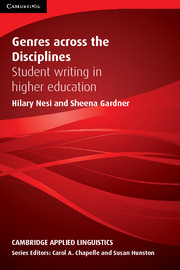Book contents
- Frontmatter
- Contents
- Series editors’ preface
- Abbreviations
- Acknowledgements
- Part I Investigating Student Writing: From Corpus to Genre Family
- 1 Investigating student writing with the BAWE corpus
- 2 Families of genres of assessed writing
- Part II Social Functions of University Student Writing
- 3 Demonstrating knowledge and understanding
- 4 Developing powers of informed and independent reasoning
- 5 Developing research skills
- 6 Preparing for professional practice
- 7 Writing for oneself and others
- 8 Networks across genres and disciplines
- Appendices
- Index
7 - Writing for oneself and others
Published online by Cambridge University Press: 07 January 2021
- Frontmatter
- Contents
- Series editors’ preface
- Abbreviations
- Acknowledgements
- Part I Investigating Student Writing: From Corpus to Genre Family
- 1 Investigating student writing with the BAWE corpus
- 2 Families of genres of assessed writing
- Part II Social Functions of University Student Writing
- 3 Demonstrating knowledge and understanding
- 4 Developing powers of informed and independent reasoning
- 5 Developing research skills
- 6 Preparing for professional practice
- 7 Writing for oneself and others
- 8 Networks across genres and disciplines
- Appendices
- Index
Summary
Some futurists and radical thinkers consider that the concepts of ‘qualifications’ and ‘professions’ may become obsolete. Instead, people will continually build their own personal portfolios of learning and development and access other learning in an open way on the internet. Each person will have a learning plan and ‘qualifications’ will become incidental markers along the way for those who need them.
(The Higher Education Academy, 2005)The kinds of assignment considered in this chapter enable students to monitor their own development or practise communicating with a readership beyond their own field. Narrative Recounts narrate a series of fictional or factual events. Empathy Writing, a term coined by Lea and Street (2000: 39), mimics non-academic genres ostensibly intended for non-experts.
If Explanations and Exercises (Chapter 3) and Problem Questions (Chapter 6) lie at one end of the convergent–divergent scale, many Empathy Writing and Narrative Recount tasks lie at the other. Explanations, Exercises and Problem Questions are favoured for examination papers because they can be objectively assessed for facts, procedures and logic, but Narrative Recounts and Empathy Writing often require greater creative effort on the part of the writer, and this can only be assessed with a certain amount of subjectivity. Moreover it may be unclear to both the writer and the assessor whether an Empathy Writing text which is effective on its own terms, for example for its potential appeal to the hypothetical reader, should be penalised if it fails to meet some more standard departmental criterion, for example regarding the referencing of sources. Problems with assessment may explain why some of the Empathy Writing and Narrative Recount genres in our corpus were written as part of multi-genre compound assignments, and accompany Case Studies, Essays, Explanations, Methodology Recounts, Problem Questions and Proposals. The assignment task required that they should be included, but it may have had little impact on the assignment’s overall grade.
Like the writing in the other genre families we have discussed in this book, Empathy Writing and Narrative Recounts demonstrate knowledge of the field of study, critical thinking, and the ability to apply appropriate methods of enquiry. In many cases they also showcase the employability skills demonstrated in the apprenticeship genres (see Chapter 6). These accomplishments are not displayed as part of an overt attempt to convince the reader of the writer’s expertise or good judgement, however.
- Type
- Chapter
- Information
- Genres across the DisciplinesStudent Writing in Higher Education, pp. 213 - 253Publisher: Cambridge University PressPrint publication year: 2012



